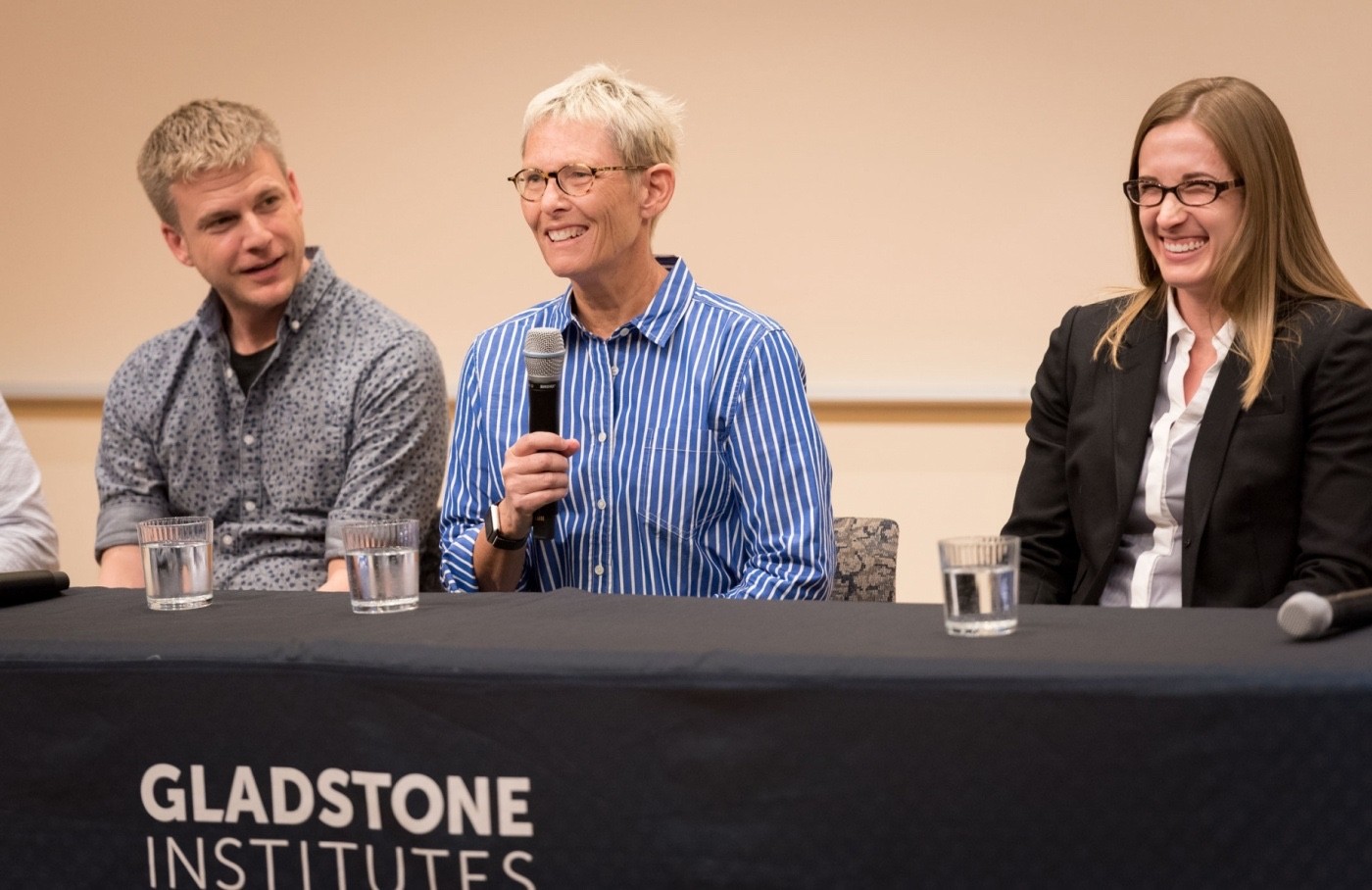Gladstone NOW: The Campaign Join Us on the Journey✕

James Sikes, PhD, Amy Kindrick, MD, and Donna Werling, PhD, shed light on the experience of being LGBTQ in the sciences.
At the Gladstone Institutes, building an inclusive community that fosters scientific excellence is essential to paving the way to new discoveries. To further this objective, Gladstone hosted its third “Out in Science” panel on May 26, 2016. This interactive event showcased the lives and careers of lesbian, gay, bisexual, transgender, and queer (LGBTQ) scientists, highlighting the unique intersection of the sciences and sexual or gender orientation.
This year’s panel was met with a full audience of students, trainees, and investigators at Gladstone’s Mahley Auditorium. Speakers at the panel included Jay Keasling, PhD, a professor of biochemical engineering at UC Berkeley, and Amy Kindrick, MD, the medical director for Immunology, Infectious Diseases, and Ophthalmology at Genentech. Also speaking at the panel were Glenn-Milo Santos, PhD, an assistant professor at UCSF, James Sikes, PhD, an assistant professor at USF, and Donna Werling, PhD, a postdoctoral scholar in the UCSF Department of Psychiatry.
“My experience in the sciences have often been that the people who get promoted are the people who look like the people who are promoting them, which are less likely to be LGBTQ or women,” said Kindrick. “But in science, you can benefit from an off-center perspective that the intellectual mainstream may not see, and so being something of an outsider has allowed me the freedom to think about certain issues in a different way.”
The speakers explored the rich intersection of LGBTQ identity and the sciences, and they touched on a major challenge facing LGBTQ researchers: how gender and sexual orientation affect perceptions of scientific competence.
Out in Science was established as part of the Graduate Queer Alliance at UCSF, which was co-founded by Mark Jeng, a graduate student who is training with Gladstone Senior Investigator Melanie Ott, MD, PhD. According to Jeng, promoting inclusivity becomes an obstacle when LGBTQ visibility in the workplace is marred by damaging assumptions.
“Promoting visibility and building a sense of community are among the many challenges faced by those in the LGBTQ community,” said Jeng, who helped to organize the panel. “By creating a space where researchers can be open about their sexual orientation and their experiences, we can propose new solutions to these challenges and encourage more people in the LGBTQ community to get involved with the sciences.”
Highlights from the panel included the speakers discussing their experience of coming out to their colleagues, as well as the experience of being role models to their LGBTQ students. Michael Penn, MD, PhD, vice president of Gladstone’s Office of Diversity, Outreach, and Mentoring, welcomed the crowd and talked about the importance of using one’s full self to empower the community and embrace many kinds of mentors to create a more diverse workforce.
“We wanted to host this event because Gladstone values foster an environment where everyone can bring their whole selves to work,” said Penn, who helped facilitate the event. “Our belief is that when inclusion is the predominant culture, people can harness their best talents to drive our mission of science overcoming disease.”
To learn more about the Graduate Queer Alliance and upcoming events, visit their Facebook page or email them at GQA@listsrv.ucsf.edu.
Support Discovery Science
Your gift to Gladstone will allow our researchers to pursue high-quality science, focus on disease, and train the next generation of scientific thought leaders.

